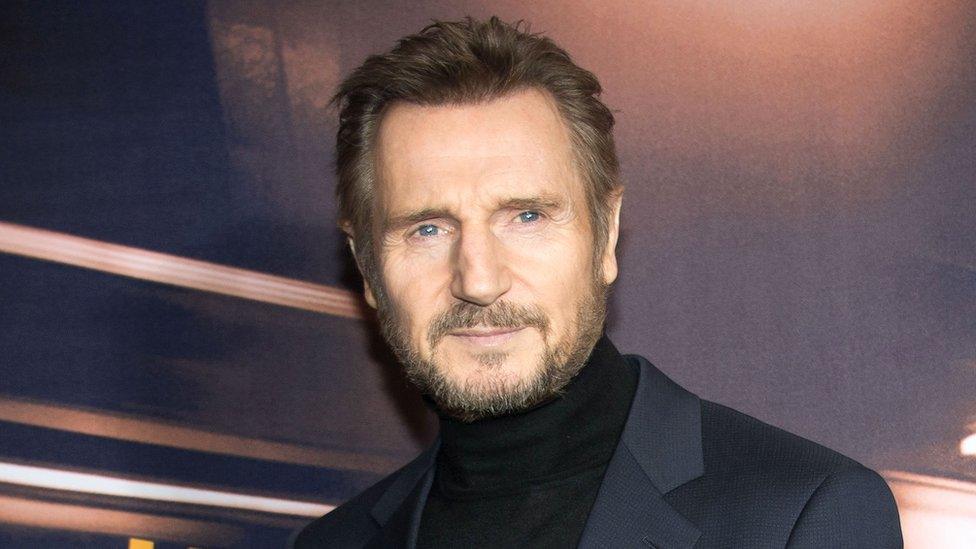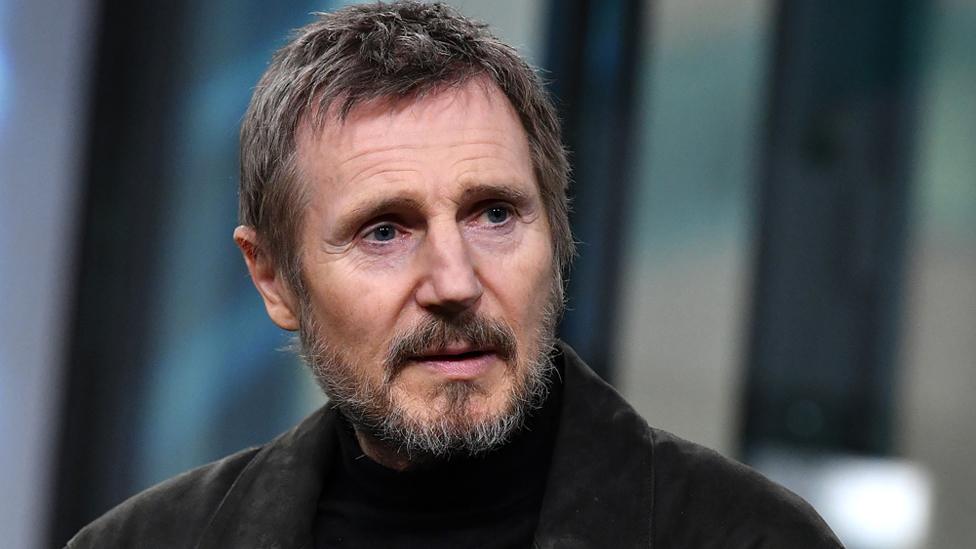Liam Neeson film's red carpet event cancelled amid racism row
- Published
Listen to Liam Neeson's comments that sparked the outrage
The New York red carpet opening of Liam Neeson's latest film has been cancelled amid a row over his comments that he once wanted to kill a random black man after someone close to him was raped.
Reporters were told the red carpet part of the Cold Pursuit premiere was being pulled with just two hours' notice.
Neeson has denied he is racist but the remarks, published by The Independent, external on Monday, sparked an outcry.
He said he had wanted to start a wider conversation about racism.
Organisers of the red carpet event said there would be no photographs or interviews at the New York City screening.
What did Neeson say?
He was speaking to The Independent to promote Cold Pursuit, a revenge thriller.
In the interview, he said the alleged rape took place a long time ago and went on to use racially offensive language about the attacker.
He said: "She handled the situation of the rape in the most extraordinary way. But my immediate reaction was... I asked, did she know who it was? No. What colour were they? She said it was a black person.
"I went up and down areas with a cosh, hoping I'd be approached by somebody - I'm ashamed to say that - and I did it for maybe a week, hoping some [uses air quotes with fingers] 'black bastard' would come out of a pub and have a go at me about something, you know? So that I could kill him."
He didn't go through with any violence, and added: "It was horrible, horrible, when I think back, that I did that... It's awful. But I did learn a lesson from it."
Playwright and author Bonnie Greer says Neeson’s race comments were a “silly, stupid thing to do”
How did he later explain his comments?
After widespread criticism, he told ABC's Good Morning America on Tuesday: "I'm not racist."
Asked what he wanted people to take from his experience, he told the host: "To talk. To open up.
"We all pretend we're all politically correct in this country... in mine, too. You sometimes just scratch the surface and you discover this racism and bigotry and it's there."
He said learning of his friend's rape about 40 years ago - she has since died - gave him a "primal urge to lash out".
The actor said he "went out deliberately into black areas in the city looking to be set upon so that I could unleash physical violence".
He said he would have acted the same had his friend's assailant been white, but admitted he had been "shocked" by his own response.
Former footballer John Barnes says Liam Neeson ‘deserves a medal’.
How did others respond?
The Guardian's Gary Younge wrote, external: "The next time someone asks me why I have a chip on my shoulder, I need no longer brush the question away with disdain.
"I can say, with all sincerity: 'Because there may well be an Oscar-nominated actor out there who wants to kill me, so I have to be alert at all times."
Kehinde Andrews, a professor of black studies at Birmingham City University, told the BBC Neeson's comments were "completely inappropriate and offensive" and to make them as he promoted a film was "distasteful".
Playwright and author Bonnie Greer said Neeson had "probably put paid to his career".
But former England footballer and anti-racism campaigner, John Barnes, defended Neeson during an interview on BBC Radio 5 Live.
"He was ashamed a week into it. He understood that he was wrong for thinking what he did. And we have to have this conversation."
Many on social media have also had their say since the story first broke on Monday.
Allow X content?
This article contains content provided by X. We ask for your permission before anything is loaded, as they may be using cookies and other technologies. You may want to read X’s cookie policy, external and privacy policy, external before accepting. To view this content choose ‘accept and continue’.

Frederick Joseph, who works for better representation in the media, wrote that Neeson's story "just shows how meaningless and inconsequential black lives are to some".
Allow X content?
This article contains content provided by X. We ask for your permission before anything is loaded, as they may be using cookies and other technologies. You may want to read X’s cookie policy, external and privacy policy, external before accepting. To view this content choose ‘accept and continue’.

But some agreed with Barnes that Neeson should not be castigated for admitting such thoughts but realising they were wrong and saying he had learned from them.
Allow X content?
This article contains content provided by X. We ask for your permission before anything is loaded, as they may be using cookies and other technologies. You may want to read X’s cookie policy, external and privacy policy, external before accepting. To view this content choose ‘accept and continue’.

Follow us on Facebook, external, on Twitter @BBCNewsEnts, external, or on Instagram at bbcnewsents, external. If you have a story suggestion email entertainment.news@bbc.co.uk, external.
- Published5 February 2019

- Published5 February 2019
